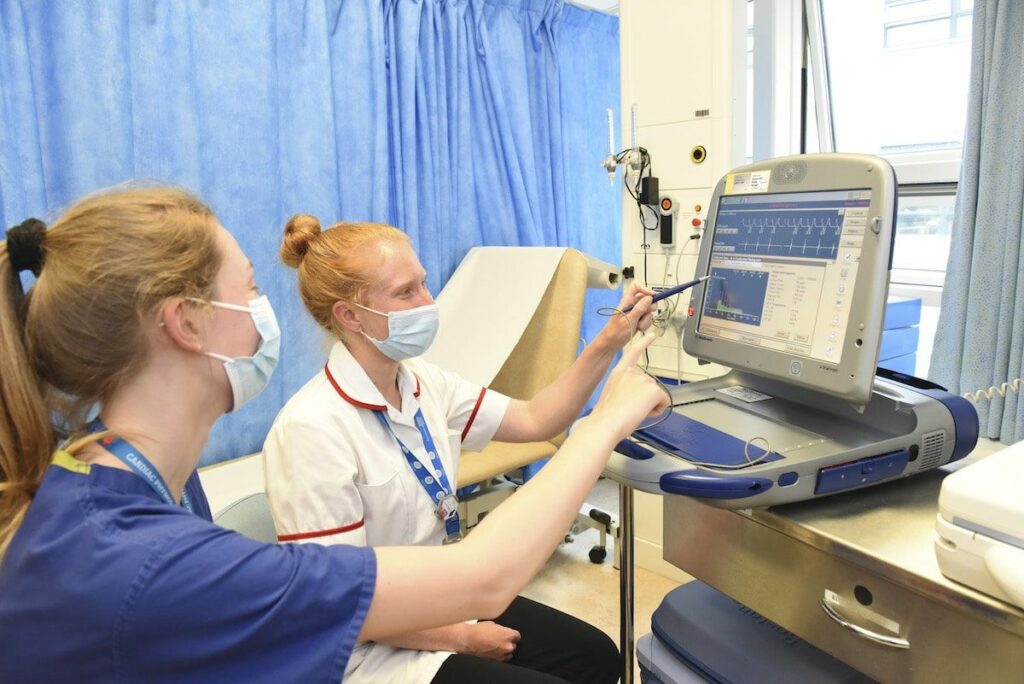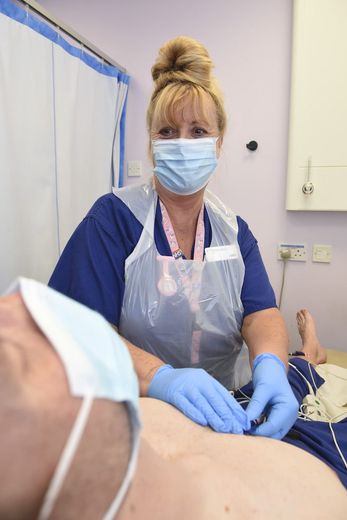Case Studies
HeartFlow would like to take a moment to recognise sites that are going above and beyond to deliver an outstanding CT service to patients.
We are excited and proud to recognise Portsmouth Hospitals University NHS Trust (PHU), which runs Queen Alexandra Hospital for its Outstanding CT Service.
The cardiac team at PHU serves a base population of 675,000 which increases to two million when factoring in acute services. While the Queen Alexandra Hospital is home to two high-end cardiac capable CT scanners, a staffing shortfall threatened to compromise its ability to conduct high quality cardiac CT services for a large patient base.
To continue to run an efficient service and respond to the high volumes of cardiac CT requirements, PHU took the unconventional decision to train its lead cardiac radiographer to administer the on-table drugs required to perform a CT Coronary Angiogram (CTCA). While this required the development of rigid protocols, careful oversight and coordination, it has successfully reduced the need for radiologists to be in attendance during scanning. As a result:
The HeartFlow Analysis has been available within Portsmouth Hospitals NHS Trust for 3 years, and together with its new approach to delivering CTCA, is helping teams to streamline service delivery and develop treatment plans that optimise the patient’s journey. The partnership between the Trust and HeartFlow has resulted in:
“Having a radiographer-led service has been fantastic. Now, with a cardiac radiographer able to administer GTNs and beta blockers, the workload for the entire team is more manageable and we’ve been able to increase our scanning capacity for both inpatients and outpatients. That means we’re able to diagnose patients faster and identify those who need more urgent intervention. To develop this service safely has taken time, careful planning and training. It has been immensely beneficial to our patients, it’s certainly a step I’d recommend to colleagues in other Trusts.”
“I’m incredibly proud of what our team has achieved, particularly during the disruption of the pandemic.”
“Having a close working relationship with the radiology team at Queen Alexandra is absolutely essential to delivering the best patient care. The more team members that can carry out coronary CTs, the quicker we’re able to develop treatment plans.”
“The strength of our relationship has also allowed us to fine tune our imaging processes and the information we share for HeartFlow Analysis. We’ve been able to hone this to the point that we’re consistently confident in the reports and findings that we receive back. Essentially, this has overhauled the way we approach coronary heart disease within the Trust, minimising our use of invasive diagnostic techniques and developing a practice that maximises efficiency. Ultimately, that reduces the time patients spend in hospital and improves their experiences and outcomes.”







The information provided by the HeartFlow Analysis is intended to be used in conjunction with the patient’s clinical history, symptoms, and other diagnostic tests, as well as the clinician’s professional judgement. The HeartFlow Analysis may not be appropriate for all patients. See indications for use for more information. The HeartFlow Analysis, featuring the FFRCT Analysis, RoadMapTM Analysis, Plaque Analysis, and HeartFlow Planner, has received FDA Clearance in the United States of America. The FFRCT Analysis and HeartFlow Planner are CE Marked in Europe and the United Kingdom and approved in Japan and Canada. The HeartFlow Analysis, featuring FFRCT Analysis, RoadMapTM Analysis, Plaque Analysis, and HeartFlow Planner, is commercially available in the United States. The FFRCT Analysis and HeartFlow Planner are commercially available in the United Kingdom. The FFRCT Analysis is also commercially available in Europe, Japan, and Canada.
© 2024 HeartFlow, Inc. | HeartFlow and the HeartFlow logo are registered trademarks of HeartFlow, Inc. Additionally, RoadMap is claimed as a trademark of HeartFlow, Inc. www.heartflow.com | 331 E Evelyn Ave, Mountain View, CA 94041
*Required fields
If you would like to request to have the HeartFlow Analysis available at a location near you, please submit your information below with details of the institution. We will share this information with the institution, but it will not guarantee HeartFlow will become available.
*Required fields
オンライン提出フォームから研究助成金を申請してください。
HeartFlow FFRCT 分析は、有資格の臨床医による臨床的に安定した症状のある冠状動脈疾患患者への使用を目的とした個別化された心臓検査です。 HeartFlow Analysis によって提供される情報は、資格のある臨床医が患者の病歴、症状、その他の診断検査、および臨床医の専門的判断と組み合わせて使用することを目的としています。
ハートフロー分析に関する追加の適応情報については、次のサイトをご覧ください。www.heartflow.com/indications.
さらに質問がある場合は、このメッセージを閉じてフォームに記入するか、サポート チームにお電話ください。: 877.478.3569.
The HeartFlow FFRCT Analysis is a personalized cardiac test indicated for use in clinically stable symptomatic patients with coronary artery disease by qualified clinicians. The information provided by the HeartFlow Analysis is intended to be used by qualified clinicians in conjunction with the patient’s history, symptoms, and other diagnostic tests, as well as the clinician’s professional judgement.
For additional indication information about the HeartFlow Analysis, please visit www.heartflow.com/indications.
If you have additional questions, close out of this message to complete our form or call our support team: 877.478.3569.Please use our online submission form on the Clinical Research Page to apply for research grants.
Thank you for your interest!

Executive Vice President and Chief Medical Officer
Campbell brings a wealth of experience to HeartFlow, where he serves as the Chief Medical Officer. Prior to joining HeartFlow, he was the Chief Scientific Officer and Global Head of Research and Development at Cordis Corporation, Johnson & Johnson, where he was responsible for leading investments and research in cardiovascular devices. Prior to Cordis, he was Associate Professor of Medicine at Harvard Medical School and the Harvard-M.I.T. Division of Health Sciences and Technology, and Director of the Cardiac Catheterization and Experimental Cardiovascular Interventional Laboratories at Brigham and Women’s Hospital. He served as Principal Investigator for numerous interventional cardiology device, diagnostic, and pharmacology trials, is the author of numerous journal articles, chapters, and books in the area of coronary artery and other cardiovascular diseases, and was the recipient of research grant awards from the NIH and AHA.
He received his A.B. from Harvard College and his M.D. from Harvard Medical School.